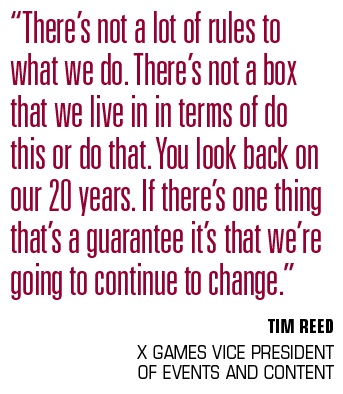Tim Reed stood on a snowy hill, watching. He was about 100 yards from the spectacle of smoke and lights that was the performance of the electro-funk group Chromeo as they strutted and shook for a crowd of 3,900.
As vice president of events and content for the X Games, Reed oversaw the planning and implementation of every element of the four-day sports event that took place from Jan. 22-25 at Buttermilk Ski Area in Aspen, Colo. On Saturday afternoon, the day that would have the highest attendance in Winter X Games history, Reed found a high perch to take it all in.
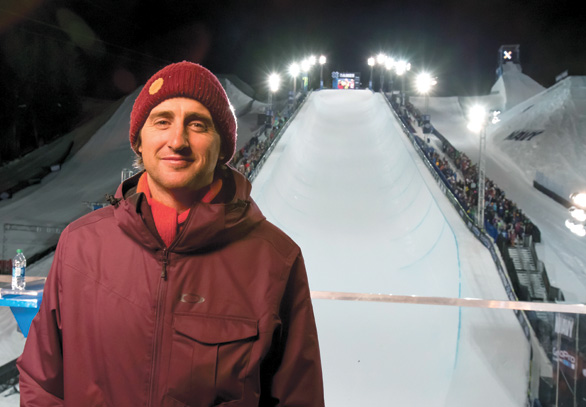 |
Reed overlooks the halfpipe at January’s Winter X in Aspen.
Photo by: Tomas Zuccareno / ESPN Images |
“These guys are perfect,” Reed said, noticing how the two-man band’s skillful but silly swagger was equally entertaining and inoffensive to a broad audience. Reed had a two-day stubble on his face, and wore a heavy maroon snow jacket. His ear-length hair was tucked under a red wool beanie.
From his vantage point on the hill, Reed could observe the breadth of all the things under his purview. This was his preferred posture throughout the day, a step back from the action, observing. He had built a team that he trusted and chose to let them work mostly uninterrupted.
In front of him was the band on stage, part of his vision to bring a festival atmosphere to the X Games. To his left was a patch of snow that would be shoveled away later that night to create a dirt road for the vehicles that would convert the snowmobile speed and style course into a snocross track before morning. In his hand was a phone that was constantly refreshing a feed of short videos aggregated from fans at the X Games through a partnership with Snapchat.
His day had already taken him to the tent in which animated terrorists and police battled in a Major League Gaming tournament. He had visited partners in the sponsor village. He would make broad decisions like changing the start time of major competitions to coincide with TV coverage, and check on small matters like the event staff that hand-sorted recyclable waste into the proper bins. His night eventually would climax at the towering slopes of the superpipe and big air courses, before finally ending right in that very spot with another concert by dubstep hero Skrillex.
Reed originally had been backstage as Chromeo prepared to perform. “Yeah, boys,” he had shouted to them as they tuned and readied their instruments. He wasn’t back there long.
“Let’s go experience this with the people,” he said. “That’s what I’m interested in.”
From Yale to the slopes
Reed, 40, grew up as a die-hard snowboarder. He attended the first X Games as a fan when it was held in his hometown of Newport, R.I., in 1995. A couple of years later, a history degree from Yale in hand, he worked to find a way to stay close to the sport he loved.
“It really comes back because of my passion for snowboarding,” Reed said. “I had been snowboarding most of my
life at that point as a kid. I was looking for a job in the snowboarding industry, but it was kind of hard to find one.”
Reed “badgered” a contact at ESPN until he was offered an internship at the X Games in 1997. He spent a month as the athlete registration coordinator, a fancy term for the guy who made credentials out of laminated Polaroids of competitors when they arrived at the event. A month later, he was offered a job in the sports and competition department at Winter X in Crested Butte, Colo., and jumped at the chance.
“It was a perfect situation. I’m going to go to Colorado. I get to snowboard in Crested Butte. Sounds like a pretty good gig, right?” he said. “I don’t think I had any idea back then. I was so green. I was happy to be in what felt like a really fun environment.”
Reed worked in various operations positions until 2002, when he joined the sports and competition department, allowing him to focus primarily on X Games competitive events. From that point on, Reed helped develop the constantly changing slate of innovative events, from high jump for motorcycles, to 60-plus-foot mega ramps for skateboarding and BMX, to snowmobile trick competitions.
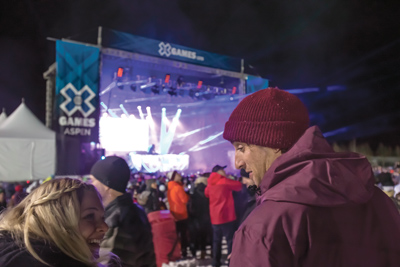 |
Reed has used events such as concerts to bring a festival atmosphere to the X Games.
Photo by: Tomas Zuccareno / ESPN Images |
These are Reed’s third X Games — two winter and one summer — since being named senior director of events and content in 2013. He reports to Scott Guglielmino, ESPN senior vice president, and with longtime X Games leaders Ron Semiao and Chris Stiepock no longer at ESPN, Reed is in sole command of the day-to-day operations and strategies of the Games.
The X Games are nothing if not ambitious, and Reed has continued that tradition.
“There’s not a lot of rules to what we do. There’s not a box that we live in in terms of do this or do that,” he said. “You look back on our 20 years. If there’s one thing that’s a guarantee it’s that we’re going to continue to change.”
Those changes have been small, like the use of drones and GoPro cameras to give new angles of coverage. They’ve also been large. Reed has fundamentally changed the vision of the X Games. Last year, ESPN moved the summer edition to Austin, Texas, from Los Angeles, its home for 11 years. Austin served as an unveiling of a new X Games strategy, one that focuses on creating a festival atmosphere rather than just a pure sporting event. The strategy included the addition of more than a dozen concerts, VIP hospitality and a Major League Gaming tournament.
All these elements returned for this year’s Winter X Games in Aspen, and the strategy has been successful on the ground. The past two X Games had the highest attendance of any summer and winter X Games in a decade. Aspen’s four concerts averaged more than 5,000 tickets sold.
“Just the notion of the ethos of progression and development and doing new and keeping it fresh,” Reed said. “I think that’s the sentiment that pervades all of us who get to work on the project and the brand.”
There have been failures, none more glaring than the Global X Games. Global X was a worldwide expansion of the brand that tripled the number of annual events by adding international stops in Spain, France, Brazil and Germany.
Though by all accounts the events were successful locally, they suffered from runaway costs, poor U.S. ratings and lack of sponsorship. Global X was shuttered in 2013 after only one year of its three-year plan, with a loss of more than $30 million.
“The biggest thing is through all of that, we learned a lot,” Reed said. “We were always proud of what we did globally, and I think a lot of that learning we’re still taking advantage of.”
Despite the slip with Global X, Reed said he would continue to monitor opportunities for the X Games abroad in the future.
Making the rounds
Reed’s Saturday was typical of his usual X Games routine. He woke about 5:45 a.m. in the condo he rents in downtown Aspen with his wife and two sons (ages 5 and 3). He grabbed a cup of coffee and took the bus 15 minutes to Buttermilk, where last year he oversaw a deal to keep the Games through 2019.
Reed had an office on the bottom floor of The Inn at Aspen, which ESPN took over, filling the guest rooms with
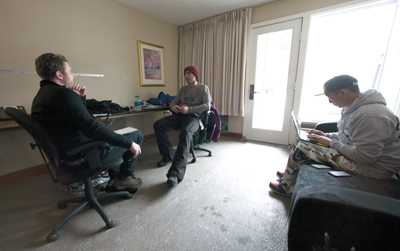 |
Reed chats with SBJ’s Mike Bebernes in the hotel that served as ESPN’s base camp.
Photo by: Tomas Zuccareno / ESPN Images |
broadcast equipment and covering the floor in plastic wrap to protect the carpet. A pair of folding tables sat where the bed presumably belonged. The only original furniture, a couch and dresser, served to prop up a pair of snowboards belonging to representatives of Monster energy drink.
Reed spent minimal time in the room. He prefers to spend his days on the move, checking in on the various elements of the event in person.
“Last night for the Snoop [Dogg concert], I stood right in the middle of the crowd,” he said. “I went out like I was a spectator because I want to know how it feels for them. I want to walk the lines they’re going to walk. I want to stand where they’re going to stand. It’s what helps future decision-making. You can’t do that if you’re not in the middle of it.”
Reed was in the middle of it again at 7 that night, inside the production booth several floors up in the massive viewing tower at the base of the superpipe. The tower was crude, with exposed metal scaffolding and black tarps serving as structure and walls, but it was welcome relief from the frigid outside air. The superpipe, built by longtime Winter X Games designers Snow Park Technologies (see story), was a spectacle with its 22-foot walls.
Massive lighting towers ran up the sides of the pipe. A jumbo screen showed highlights from earlier competitions.
With all of the impressive infrastructure, the first things Reed pointed out were the simple metal grates that ran up the side of the pipe to help spectators scale the hill. “I’m not sure anyone else does that,” he said.
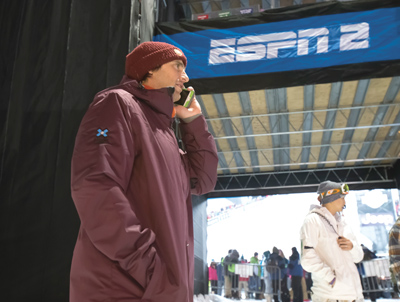 |
Said Reed, “Sometimes you have to make a decision on the fly. You live by it and hopefully you make the right decision.”
Photo by: Tomas Zuccareno / ESPN Images |
Reed assumed his preferred position, standing quietly in the back of the room. He watched Sharon Bauer, X Games director of event production, as she guided coverage of the women’s snowboard competition. The room was full of flat-screens and computers on wooden folding tables. Reed’s attention darted between watching the athletes and the steady hum of activity in the booth. In the pipe, 14-year-old Chloe Kim completed a near-flawless run to become the youngest Winter X Games gold medalist ever.
“Oh sick,” Reed shouted when her score posted. “That was insane.”
Moments later his attention was on a screen to his right, which showed each of ESPN’s many broadcast feeds. The X Games were scheduled to go live on ESPN’s main network with men’s ski big air at that moment. But more than 1,400 miles away in Ann Arbor, Mich., guard Derrick Walton Jr. had just drained a three from the left wing to send his team’s matchup with No. 6-ranked Wisconsin to overtime. The game would monopolize the mothership for at least another 20 minutes. After a short, near-whispered conversation with Bauer, they were each on their radios. The start of big air would be delayed as long as possible to ensure live coverage on ESPN.
“Not everything we do is written,” Reed said. “We’re not 50 years old. You think you’ve mapped out all of the potential adjustments, but sometimes you have to make a decision on the fly. You live by it and hopefully you make the right decision.”
Half an hour later, Reed was at the base of the big air jump waiting for the first athlete to sky over the horizon, spinning and flipping through the pitch black sky.
Thinking of what’s next
The next morning Reed stood at the base of Buttermilk, one foot strapped into a snowboard. He finally had a chance for a few runs down the mountain himself. His stubble was a bit longer, his eyes a bit heavier, the same red beanie perched on his head. The crowd last night was the biggest ever at a Winter X Games, a fact that was news to him.
The bulk of the effort was done by Sunday, but he’d still be in Aspen for another few days. There was much to digest and issues to be resolved for next time. Crowd flow hadn’t been quite as smooth as he’d have liked it to be and they would need to identify a location for more VIP hospitality for next year.
Reed’s approach to planning the X Games echoed the athletes’ approach to courses he helped create: always pushing for bigger, bolder, more amplitude.
“We get the ultimate opportunity twice a year to really create what we want and I think that’s pretty fun,” he said. “I’m well-aware, I think, of the fun and the creativity that we get to have.”
His mind wasn’t totally reflective. He was in the moment enough to still worry that the sun wouldn’t break from the morning clouds. Better light would help the participants in the women’s slopestyle competition that was about to begin.
“We need to get some light for these girls,” he said before pushing off with his free foot toward the ski lift.
The sun was a factor he didn’t have an answer for, not yet at least.



